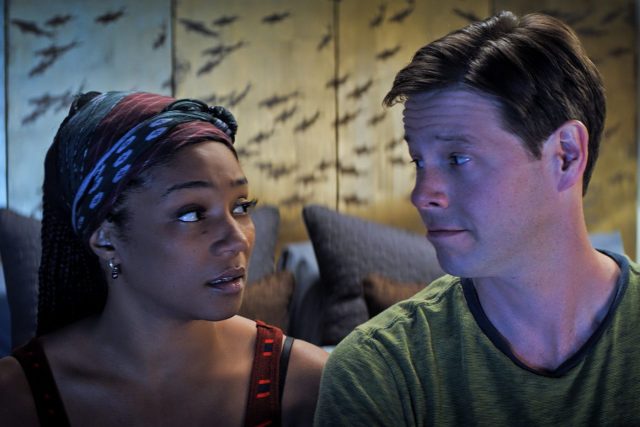The Oath: Carved Up, by David Bax
If you’re looking for a silver lining to our current divisive, incendiary political atmosphere, maybe the fact that we’re all so angry with each other is a sign that we at least still care about our country and its future. Ike Barinholtz’ The Oath imagines a fascist American dystopia just a nudge or two away from our current one. With his eye keenly trained on the various ways ideology manifests as personality, he wrings both hilarity and dread out of the chaotic moment before hope is lost. And then, optimistically (if a little clumsily), he pulls us back.
Barinholtz stars as a bourgeois, liberal suburban dad, who is preparing, along with his wife (Tiffany Hadish), to host his family for Thanksgiving dinner. His sister (Carrie Brownstein) and her husband (Jay Duplass) round out the left wing of the family, while his parents (Nora Dunn and Chris Ellis), his brother (Jon Barinholtz) and his brother’s girlfriend (Search Party’s Meredith Hagner) form the right. Exacerbating the political tension is that the day after Thanksgiving is the last day for citizens to sign a Presidential loyalty oath, a totally optional, voluntary thing that probably won’t be used to identify the troublemakers who refuse to sign.
Thus, the arguments that erupt over the holiday have less to do with policy and more to do with the basic definition of what it means to be a patriot (more of a post-9/11 Bush era question than a Trump era one but, then again, we’ve never had a president more likely to demand an oath of loyalty than our current one). Specifically, is it more patriotic to use the free speech and dissent that the nation’s founders built into the country’s framework in order to fend off tyranny or is it more patriotic to simply pledge blind fealty to our leaders just because they’re our leaders? The Oath is exactly as clear about which side it’s on as I just was and that’s to its benefit. If it pretended at “both sides” balance, it would be disingenuous. Instead, Barinholtz is free to aim his satire where it can do more good, like at the way we continue to fake normality even as things fall apart. Our liberties might be disintegrating but it’s Thanksgiving and the Lions are playing. But at what point does such behavior cross the line from self-care to insanity?
Well, how can you even tell the difference when our reality itself is insane? Barinholtz repeatedly cuts to fictionalized cable news panels to comment on various points of what I’ll politely call disagreement between the two sides of an issue. In one such segment, the liberal commentator compares the film’s current presidential administration to the Third Reich. The conservative on the panel immediately groans that liberals always go straight to Nazi comparisons. This is a common back and forth in our real world but the criticism on the part of the conservative would carry a lot more weight if the President (both the one in The Oath and ours) weren’t behaving like an actual Nazi.
The Oath takes a dramatic narrative turn when, on the day after Thanksgiving, two federal law enforcement officers (John Cho and Billy Magnussen) show up to question Barinholtz’ outspoken, oath-refusing character. It’s an expansion of the movie’s world but also of its thematic ground. Now, just as much as we’re watching a movie about familial political turbulence, we’re also watching one about how prevailing ideas about what it means to be a man dictate our actions and reactions. The officers are tough guys with badges, uniforms and guns. Barinholtz is the “man of the house.” The fear of having their masculinity questioned turns these men into unstoppable forces and immovable objects.
Things go increasingly haywire in The Oath until they are fairly suddenly resolved by a nationwide deus ex machine. If it’s a bit of a narrative cheat, though, it’s actually a bold thematic statement about what it’s going to take for us to start getting along again. I won’t spoil it here but I will say that The Oath is, like most political satire, at its strongest when turned against itself (or, at least, the people like me who are likely to agree with it). Barinholtz believes that his Whole Foods loving, protest attending NPR dad character is right. But, he points out again and again, being right doesn’t make you not an asshole.






























